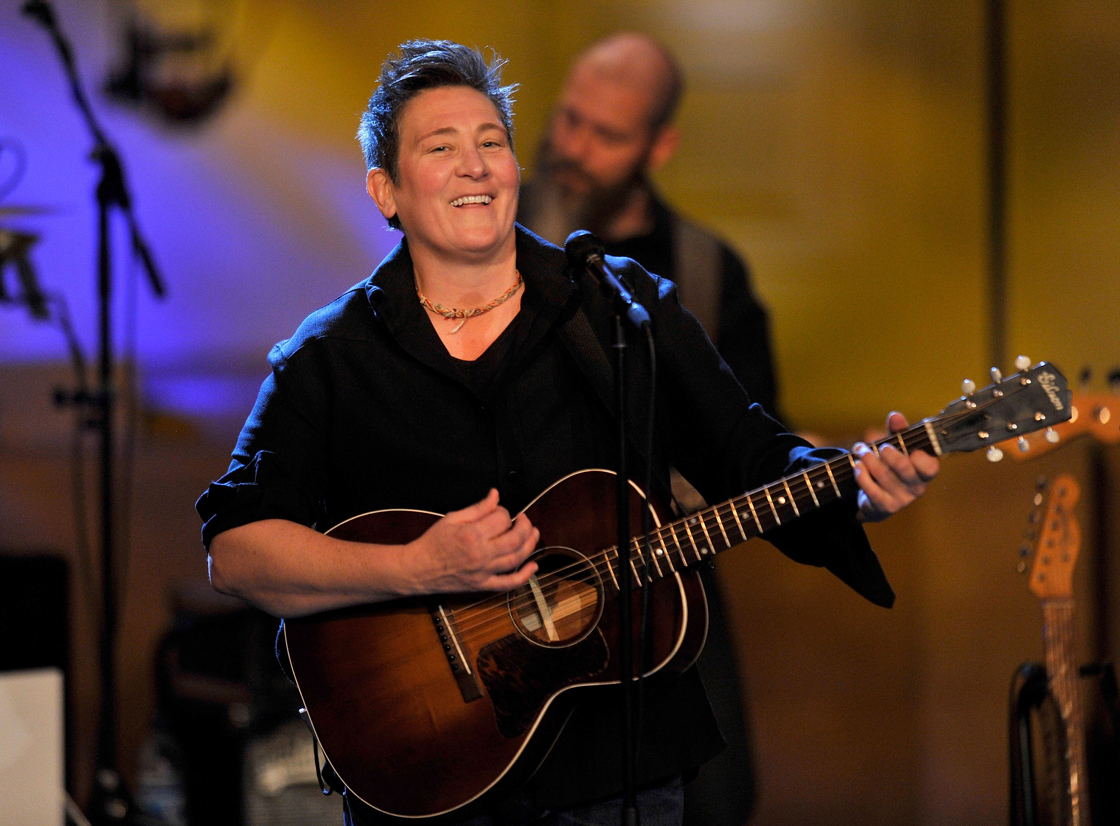TORONTO – It’s fitting that k.d. lang’s enshrinement in the Canadian Music Hall of Fame — an acknowledgment of an influential, restless three-decade career in which she constantly bent ideas of genre and gender — should happen at the Juno Awards.

After all, the Junos have long been a primary outlet for memorable exhibitions of lang’s unique talent and viewpoint.
Recall her first Junos bow in 1985, when the Consort, Alta.-reared singer accepted the trophy for most promising female artist dressed in a wedding dress and matching cowboy boots — an outfit she figured was appropriate given the award (“you make a lot of promises when you don that thing,” she quips now).
More recently, lang took the stage at 2005’s show in Winnipeg to fill in for an ailing Neil Young, who had recently suffered a brain aneurysm. In his absence, lang performed two songs — including a stunning take on Leonard Cohen’s “Hallelujah” that earned the singer a one-minute standing ovation.
“I was dying — I was literally dying,” said lang in a recent telephone interview, recalling how she felt before delivering the oft-cited Juno hallmark.
She spent the day in her trailer waiting, worrying and exercising her Buddhist practices to keep calm.
“I was so frightened,” she recalled. “I was just praying and praying that I would settle down. And I got up into my position, and all of a sudden, I just absolutely calmed down. I almost went to a point where I was like, more aware than I’ve ever been in my life.
“It was absolutely the pinnacle of my musical career,” she added. “It was, personally, my greatest offering. It was my best I could do. It was absolutely the best I could do.”
And given lang’s long, rarely static career, that’s hardly a minor statement.
She emerged in the mid-80s as a maverick country crooner with an undeniably lush, powerful voice and an ironic sense of humour. While she won country awards, such early albums as A Truly Western Experience and Angel With a Lariat found lang seeming to simultaneously celebrate and tease the staid genre with a subtle sense of camp.
Even as 1988’s remarkable Shadowland and the next year’s Absolute Torch and Twang made clear lang’s serious reverence for the elegant country of such icons as Patsy Cline and Loretta Lynn, lang was never quite embraced by the Nashville institution — and now she views her country period as being part of a different tradition.
“I think that I was just feeling and creating something that has become Americana, from anyone from Neko Case to the Decemberists and I don’t know, Mumford & Sons in some respect,” she said.
“I just think that there was an interest in country music from a completely different perspective, and I just happened to be a part of it.”
And if her music seemed too slyly radical for country’s old guard, her outspoken personality only cemented her outsider status.
Even before she came out as lesbian in 1992, lang faced controversy after recording a promotional TV spot for People for the Ethical Treatment of Animals in which she hugged a cow named Lulu and memorably argued: “If you knew how meat was made, you’d probably lose your lunch.”
Prior to the spot even airing, dozens of radio stations in cattle country dropped lang from their playlists, while her beef-boosted home province was no more kind — a sign in Consort identifying it as the “Home of k.d. lang” dissolved in flames.
The revelation about her sexuality, presented in a 1992 issue of the Advocate magazine, brought a comparatively warm response, she recalls.
“It was very emancipating for me,” she said.
“(The response) was, in general, pretty positive. I think there was still a lot of discrimination, as you can imagine. But at the same time, my personal situation with my family and my friends was very solid and very open and (they were) aware of my sexual orientation at that time, so I personally felt pretty safe.”
By then, lang was an international star who had already claimed three of her four career Grammys and eight Junos. But she felt as though the conversations around her outsized personality were overwhelming the music.
She began to retreat slightly from the fame that had started to become a drain on her life.
“I enjoyed it on the way up, and then once I sort of hit the top and saw the aftermath of all the things that came along with it — or the baggage that pertains to it — I realized (I wanted a change),” she said.
“I was famous for being gay or being a vegetarian. It didn’t seem sustainable to me, and it didn’t really seem that healthy. The focus wasn’t necessarily on the music.
“And that’s a lot of my own doing,” she added. “But I think I realized very, very immediately that I really had to sort of refocus my career back onto my music, and that’s what I’ve been spending the last 20 years doing.”
And musically, 1992 also marked the first major change in direction of lang’s career, as Ingenue found her shifting into subtler shades of accessible adult contemporary (and it featured a Grammy-winning hit in “Constant Craving.”)
Over the next two decades, she wandered restlessly from butter-smooth vocal pop (2000’s Invincible Summer), to a vocal-jazz collaboration with Tony Bennett (2002’s A Wonderful World) and finally to cowpunk-infused alt-country (2011’s Sing it Loud).
Remarkably, she remained fairly commercially consistent even as she wandered creatively. Five of the seven studio albums released since Ingenue have reached the Top 10 on Canada’s album chart, and she amassed gold and platinum plaques at home as well as in the U.S. and Australia.
It’s the diversity of lang’s career — along with her stirring talent — that continues to inspire.
“She’s had such a versatile career,” said Emilie-Claire Barlow, a Juno nominee for vocal jazz album of the year. “She’s sung in a few different genres and she’s a real musician. She’s got the most unbelievable voice.”
“She’s the goddess. She is the Canadian goddess,” added fellow Juno nominee Rose Cousins, who celebrated lang’s inclusion in the Canadian Music Hall of Fame.
“She’s undeniable and it’s certainly the right place for her.”
Looking back, lang herself certainly doesn’t regret her far-reaching musical ecleticism.
“I think the only negative impact would be one of marketing and demographics and having sort of a very clear idea of who my audience is,” she said. “But to juxtapose that, it’s been the thing that is my biggest asset, I think, because it keeps me fresh and it keeps me interested in music.”
And attempting to duplicate prior success has never seemed a wise strategy.
“I’m not really any good at that,” she said. “You can’t recapture something that is inspiration, because then again it is contrived, then it is regurgitation.
“It’s important to me to stay vulnerable to the way of the muse, and just allow myself to make mistakes. And sometimes I get lucky. Sometimes I make stinkers. And to me, they’re all the same. To me, it’s just what happens.”
That bluntness is characteristic of the 51-year-old lang, who’s forthright but economic as she tersely sizes up elements of her career. Asked why so few artists have taken up the task of covering her songs, she’s definitive.
“That’s because I’m a (crappy) songwriter,” she says with a hearty laugh, in fact using a saltier phrase in her self-evaluation. “Let’s be honest.”
Does she really think that?
“No, obviously I don’t — or I would stop writing altogether. But you know, there’s a lot of really good songwriters out there.”
She’s similarly frank when asked about new music. Sing it Loud found lang collaborating with the Siss Boom Bang backing band and seemed to indicate a clearer direction forward for the singer than she’s had in quite some time.
Yet, she says she’s not sure where she’s headed, or when new music might materialize.
“I’m definitely taking some time to sort of empty out and … really, really take stock and figure out where I want to go next,” she said. “That could change tomorrow. But right now, it just feels like it’s going to be a while (until new music comes out).”
The industry seems to carry less importance to lang than it once did, in part because her devotion to Buddhism has put things in perspective.
“It’s not the end of the world — it’s not the most important thing to me,” she says of music. “It’s something very important because it’s what I am and what I do, but it’s not me entirely.”
So as the Junos gild her career with the Canadian industry’s ultimate honour, lang looks ahead to an uncertain future. It seems to suit her.
And, by the way, did she ever discuss that nerve-rattling “Hallelujah” with its iconic creator?
“No, I haven’t seen Leonard after that,” she replies, before adding with a laugh: “I think he must be sick of it, because I’m sick of it.”





Comments